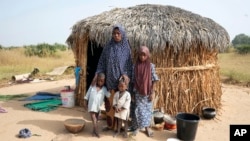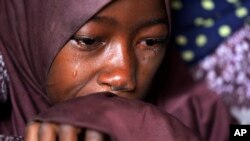Ali, 40, knew she and her family might never see their home again.
In this remote village —in the Gashua part of Yobe state, a largely agricultural area in northeast Nigeria— poor infrastructure means annual flooding of excess water from the local river. Most villagers pay little attention to warning signs as the water rises. Dealing with floods is a way of life.
But this year, heavy rains inundated Nigeria and neighboring countries in flooding the region hadn't seen in at least a decade, due in large part to climate change. Ali and her husband knew this time was different. The water reached their home and started rising in the hut.
Ali and the children walked down a narrow, water-logged road. Her brother's cart, pulled by cows, came up behind them. He agreed to take some of the children. Not all would fit.
Ali made a quick calculation. She figured the cart could get some of them to safety faster. She told five of her kids to get onboard. She and the others would follow by foot.
Nine-year-old twins Hassana and Husseina climbed in, with their headscarf and traditional green dresses flowing to their toes. Younger sisters Hauwa, 8, and Amina, 5, followed. So did 7-year-old brother Gambo.
They chattered with excitement — a cart ride was a rare outing, and they were too young to understand the dangers of the water around them.
Ali assured her family they'd all be reunited soon.
The flooding that began in June has become the deadliest in more than a decade, according to authorities of this West African nation with more than 600 killed, thousands of homes are destroyed, along with farmland, and more than 1.3 million people have been displaced.
The environmental crisis has unfolded alongside a humanitarian one: a decade-long conflict with roots in an extremist-pushed insurgency against the government.
Flooding has made delivery of aid and supplies increasingly difficult.
Officials blame the floods on the release of excess water from Lagdo dam in Cameroon and higher-than-normal rainfall. No matter the cause, the effect in villages such as Tabawa has been widespread.
Authorities report that they've distributed relief items to affected families and have tried to evacuate some to displacement camps. But no such camps or efforts exist in Tabawa, population 1,000, or its surrounding towns. Those who flee must do so on their own, to displacement camps tens of miles away.
For Ali, it meant taking her family from the only home they've ever known.
"While the flood was trying to destroy things, we were trying to save ourselves,” she said.
Buba Mobe, 25, navigated his cart gingerly but with the water waist-high, it tumbled and toppled over, spilling the children onto road and into the floodwaters.
Mobe tried to save those closest to him, first plucking up Husseina and dropping her into a shallower area. He rushed back to get the others, but they'd disappeared underwater.
Mobe rushed to find other villagers to aid in his search. By the time he returned with help, it was too late.
“When we found their bodies, they were already swollen,” he said.
Eventually Ali and her other children reached the scene. Husseina ran and clung to her mother. Ali found herself in shock, and all broke down in tears.
“I went to the dead bodies and touched their heads," Ali remembers. "I rubbed their heads and thanked God for his mercies.”
She never imagined that the children in the cart would be in more danger than those walking on the road. But she took it as God's will. "There was nothing I could do,” she said.
The villagers carried the bodies of Hassana, Hauwa, Amina and Gambo back to Tabawa.
The funeral was solemn and quick. Dozens of villagers gathered at the farmland where the children’s bodies were buried in small graves. Days of praying at the mosque followed.
“I try to remember them, especially at night, but there’s nothing much left,” she said, with their clothes and most belongings also taken by floodwaters.
The family's hut was destroyed, so they no longer live in Tabawa, where the children are buried. Their new home is in Darayami village, 7 miles (11 kilometers) away.
Like many families scattered across new lands in search of better living conditions, Ali and her relatives have no connection to this place — it's simply where they could find room to start over. They hope to return to Tabawa someday, but for now they focus on survival.
"No food, no shelter, no place to even sleep well,” Ali said.
But she clings to her faith. She holds Husseina tightly to her belly. “It is all God’s plan,” Ali tells her as they begin yet again to cry.

